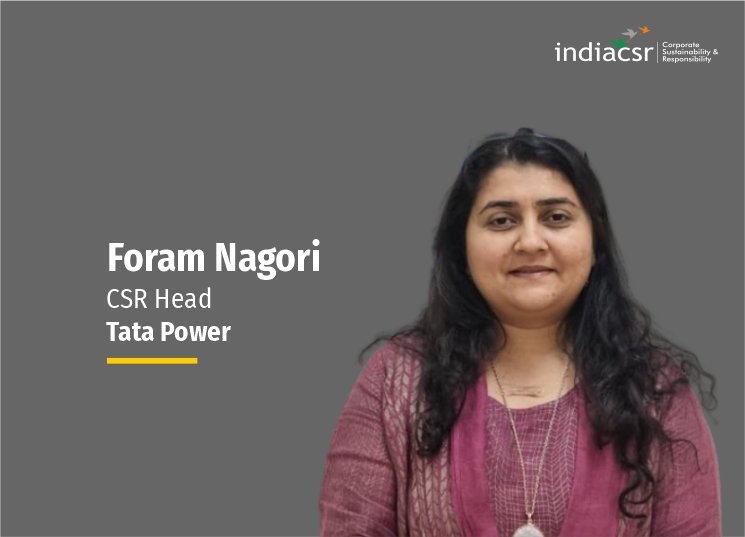As a young developing nation with immense potential, grassroots community-led development withy focus on empowering micro-entrepreneurs, socio-innovators, and change agents can play a critical role in India’s transformational journey. The overall growth of the nation is heavily dependent on the empowerment of its youth, with an ever-increasing need of efforts towards building capacities, skill development and employability. Right investment by corporates on outcome-based development, with on-ground support and much-needed hand-holding, can massively empower the grassroots collectives, contributing to the larger development of India’s economy.
A 115-year old legacy is no small responsibility. As the country’s oldest and leading integrated utility, Tata Power today serves over millions of lives – not just through the business value chain but also through the social development programmes run through Tata Power Community Development Trust. As a leader in the power sector; it has a vantage position that not many other sectors have – do good for the nation by driving inclusivity and excellence in its operations that serve many a remote & underserved areas.
TATA Power’s CSR programs have positively impacted 4.6 million lives in FY 21 through various interventions undertaken in Education, Employability and Employment, Entrepreneurship and Disaster Management, claimed Foram Nagori, CSR Head of the company during an interview with India CSR. Excerpts:
Tell us briefly about the Tata Power’s CSR flagship initiatives.
Tata Power’s key flagship CSR programs include Anokha Dhaaga for empowering women and farmers collectives, Roshni Integrated Vocational Training Centers, Adhikaar for enabling access to state social security schemes, Club Enerji for developing conservation champions, Arpan volunteering platform, Mahseer conservation activities and Tree Mittra for furthering region-appropriate native species plantations & biodiversity restoration. Through its Tree Mittra program, over 8.5 lakh saplings have been planted in the year 2021.
The power of collective efforts and grassroots networks were found especially meaningful during the pandemic. The company’s collaborative work with government initiatives, experts, civil society partners & grassroots community institutions to further social equity & balanced regional development created a trust-based network which proved to be of immense mutual value during Covid-19 pandemic. The company’s holistic approach towards relief and resilience measures supported over 2.6 million citizens, more than 150 public institutions around 65 operating sites by strengthening the abilities of PHCs, sub-centres, special vaccination & care centers, district administrators, sarpanches, police, ANMs, women’s collectives and others. Oxygen support, protection gear and medicines were provided across underserved neighbourhoods with the support of partners, community leaders, women’s SHGs, CSR teams, volunteers & extended Tata family. There was an active contribution from women’s SHGs of Tata Power’s Anokha Dhaaga program in making and donating high protection filter based masks appropriate for Indian weather and immunity booster tea masala, Ashwagandha powder; also enabling wages and livelihoods for these women during tough times.
In particular, the role played by Tata Power employees as essential service providers and their exemplary commitment amidst thick & thin of several disaster situations including the COVID pandemic has been noteworthy. Also furthering the Tata philosophy of ‘Give Back’ many employees along with their families even went beyond their call of duty to offer voluntary services along with their family members & participated in serving the Communities through dedicated tele-helpline interventions, etc. The company continues to support vaccination supplementation with government authorities and partners in remote parts of Bihar and UP and aids registrations on COWIN through push calls as a part of its flagship program Adhikaar.
What have been the key milestones and how have these initiatives contributed in transforming the community?
In 2020-21, Tata Power’s CSR outreach positively impacted 4.6 million lives in 60 districts spread across 17 states. Over 10 aspirational districts (as defined by Govt of India) and many marginalized communities are served are served as a part of Affirmative Action efforts; focusing on inclusion of communities from Scheduled Castes & Scheduled Tribes. The vision is to impact over 80 million lives through direct & indirect means by FY2025-26.
Under financial inclusivity, the company empowered nearly 7 lakh community members to access and secure benefits from various welfare and social security schemes. The company also trained more than 47,000 youth through Tata Power’s flagship employability and employment programs. Along with this, more than 21 lakh community members benefitted through Tata Power’s need-based community development and stakeholder outreach across businesses and 77000 women micro-entrepreneurs benefitted through Tata Power’s flagship entrepreneurship initiatives. During Covid outbreak, Tata Power’s extensive response benefitted more than 1.6 million community members. Aligned to Tata Group’s philosophy of empowering socially and economically disadvantaged sections, Tata Power’s CSR efforts across themes positively impacted lives of 4 lakh youth.
What are the top women empowerment CSR initiatives of Tata Power?
It has become imperative to create more opportunities, enablement & ecosystems for women to pursue their life goals to propel larger social betterment. Tata Power, through its focus area on women empowerment, works towards holistic development, by leveraging our influence circles to further equity, diversity & inclusion, not just in our workplaces but also across communities through our value chains – upstream & downstream to enable inclusive communities & society.
Tata Power’s flagship CSR programmes further women empowerment and inclusion of other marginalized groups (including backward and tribals) as a horizontal focus. The company also drives inclusivity through programs like ABHA in Delhi, Odisha, and Mumbai, which support the engagement of numerous semi-skilled/unskilled women as a part of its value chain. This is structured as a shared value engagement supporting lives & livelihoods, leveraging technology as a tool and upskilling women to serve as ‘community change agents’ not just for electricity metering, billing & collections but also for driving ethical & transparent energy use and breaking the cycle of electricity thefts. These groups of women also serve as ‘Adhikaar Mittras’ to further financial & digital literacy, while embedding progressive social behaviors into their communities.
Tata Power’s flagship Anokha Dhaaga has been particularly designed to build capacities of women’s collectives (Self Help Groups) and help them become empowered & earning members of society. Initiated in Maval in Maharashtra in 2015, with just 16 women, the initiative now has grown to multiple sites, with over 1,500 women members. It trains women in stitching, tailoring, other micro-enterprises like making baskets & herbal merchandise. The women manufacture readymade garments, home & personal utilities, and traditional handicrafts, augmenting their household income and along the way promoting local talent and conserving traditional art.
Let us know about your association with BlessedBox and Nida Mahmood? What has been the rationale behind this initiative?
Anokha Dhaaga – Tata Power’s women empowerment initiative, collaborated with BlessdBuy – a platform showcasing 1000+ sustainable & ethical products made by rural artisans, collectives, and NGOs, on a limited edition of ‘BlessdBox’. This edition is a festive gift box designed by Nida Mahmood, ‘Queen of Indian Kitsch’ – aimed at supporting the livelihoods of aspiring women’s collectives. Through this project, Tata Power aims to achieve its vision to build aspirational value for these collectives and empower them to be a part of the designer value chain.
With this gift box series, Anokha Dhagaa is making an earnest effort to give a platform and showcase unique, sustainable, and ethically handmade products created by the underserved communities from rural & urban regions of India. With an emphasis on circular economy and sustainably sourced materials, this project endeavors to upskill and empower marginalised communities.
The collectives got an upskilling opportunity during the pandemic through digital and in-person quality training and handholding to develop this designer & aspirational product line. Over fifty percent of the sales proceeds from this project go directly to the women makers in Delhi and Jojobera – increasing their earnings by more than double of the average earnings they get by producing for local markets.
This range of just 1000 lovingly hand-made boxes includes an assortment of stunning tableware sets of 6 table mats, coasters, napkins, and a safety face mask. Inspired by the grandeur of regional Indian designs, the range available in two designs – one set inspired by Lucknow Chikankari patterns and the other by floral patterns from Mughal architecture. It is meant for connoisseurs of sustainable home-décor products who flaunt a lifestyle that is refined yet conscientious. It is an opportunity to own a piece created with pride and confidence by the Anokha Dhaaga women who weave their dreams with these boxes.
This limited-edition collection is available to shop at in-house e-commerce platform SaheliWorld.org and through multiple marketplaces including Amazon, Flipkart, Myntra, Jaypore, Tata CliQ, and Zwende.
What would be the key focus areas in future? How do you wish to move forward with your CSR plans that focuses on creating value for the business and society?
India has a rich demographic dividend of over 49% women voters base & over 6 million women’s collectives (Self Help Groups) spread across its states. This grassroot institution has huge potential & promise to be the harbingers of change, of progressive communities & inclusive societies. Our CSR & voluntary efforts shall continue to champion & enable these institutions and groups; build their confidence, knowledge & skills to access more & more opportunities for collective growth & livelihoods. We look forward to enabling energy security in underserved regions, promote clean energy & shared value in association with social innovators, and changemakers.
(India CSR)



























